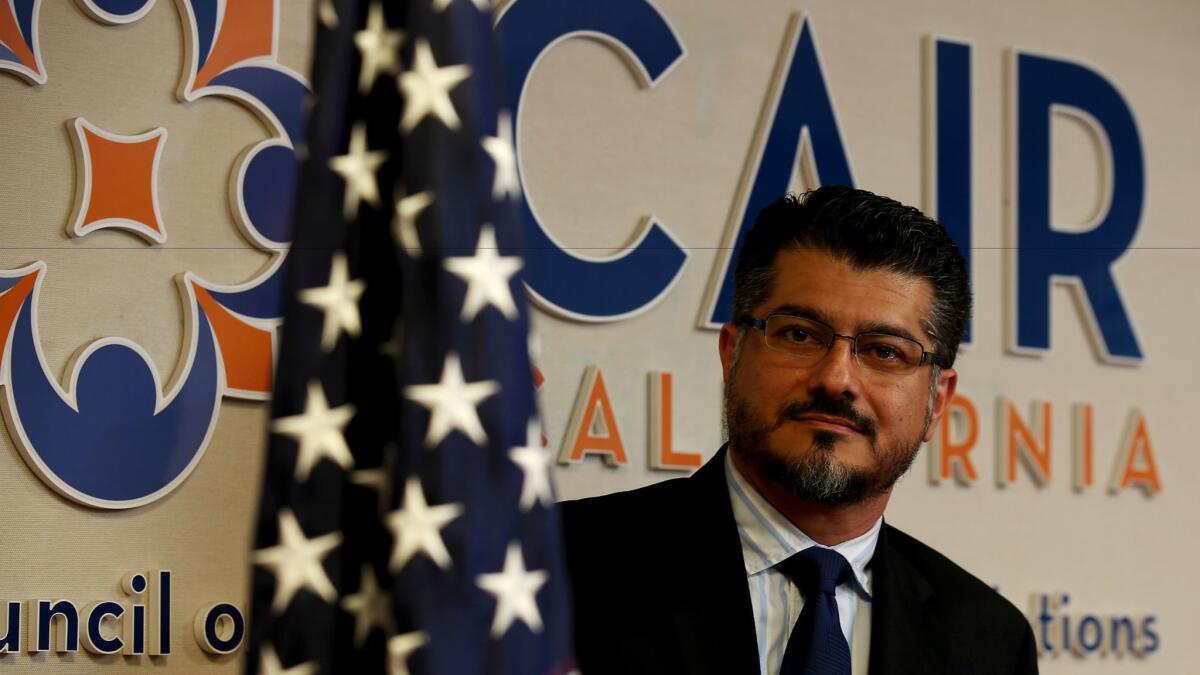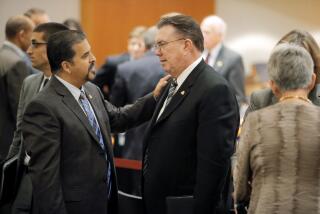How a prominent Southern Calif. Muslim spokesman handled a tweet gone wrong

Prominent Muslim spokesman Hussam Ayloush had pulled over his car to refuel on a trip from Southern California to visit family in Texas on Christmas Day when he had a thought.
A Russian military passenger jet en route to Syria had crashed in the Black Sea, he had learned earlier that morning, and after conducting a cursory search on the model he deduced that type of aircraft usually carries soldiers.
For the record:
10:54 a.m. April 26, 2024A previous version of this story said that Hussam Ayloush learned about the crash of a Russian military jet on Christmas Day while refueling at a gas station. He had, in fact, first heard about it earlier that morning through a messaging group.
He posted a message to Facebook and Twitter, and drove off.
“I’m sad about the crashed Russian military jet. The TU-154 could have carried up to 180 military personnel instead of just 92!” the tweet read.
From the swift reactions on social media, Ayloush, executive director of the Council on American-Islamic Relations’ Los Angeles chapter, soon realized he had erred: Some called him vicious for wanting more bloodshed in the ongoing civil war that has killed hundreds of thousands of Syrians, many of them civilians. His Twitter followers criticized him. Conservatives noted that Ayloush is a Democratic convention delegate. Others called for the death of Muslims. Still others asked for an explanation.
Ayloush, whose parents are Syrian, didn’t know at the time of the tweet, he said, that the plane was carrying several journalists, a prominent Russian philanthropist and members of a Russian military choir heading to perform at an air force base. To his followers, it sounded as if he wished death on even more civilians and noncombatants. Ayloush said he felt “devastated” and “really bad.”
Ayloush’s response also came quickly. He took down the tweet, and posted a long message on Facebook. “I regret that my anger and emotions over the tragic situation in Syria got the best of me,” he wrote. “My tweet was wrong and I sincerely apologize to those hurt by it, especially the families and loved ones of the innocent people who died in the crash.”
He would never, he continued, “condone/tolerate the death of Russian or any other civilians.”
A spokeswoman for CAIR-LA directed inquiries to Ayloush’s response on Facebook and noted that no disciplinary actions had been taken against him.
In an interview, Ayloush explained that before he learned who was on the plane, he assumed that if fewer soldiers made it to Syria, fewer Syrians would die.
“It’s like hearing the day of Pearl Harbor that some imperial Japanese airplanes crashed before reaching Pearl Harbor,” he said. After the apology, he said, most people were understanding. Some comments on his Facebook post thanked him for apologizing; another called him a “scumbag.”
It was uncertain whether the contretemps would prove damaging to the reputation and standing of Ayloush, a delegate to this year’s Democratic National Convention as well as a member of the state party’s executive board, a group of about 500.
State Republican and Democratic leaders either said they weren’t aware of the tweet, declined to comment or could not be reached. The Russian Embassy did not return requests for comment. Ayloush said he hadn’t gotten a response from Democratic Party officials.
“For people who will look at it in an objective way, it shouldn’t be an issue,” said John Esposito, a religion and international affairs professor at Georgetown University who directs the Bridge Initiative, a research project that studies public perceptions of Islamophobia. “People who want to go after Muslim groups, who are ultraconservative, will make an issue out of it.”
The blowup comes at a precarious moment for American Muslims, as they await the inauguration of president-elect Donald Trump, who has said disparaging things about the religion. But people in the community say that one tweet doesn’t make them any more vulnerable.
Trying to address issues like the Syrian crisis on Twitter and Facebook obviously has its limitations.
— Salam Al Marayati, executive director of the Muslim Public Affairs Council
“The attacks from the outside are going to continue regardless,” said Salam Al Marayati, the executive director of the Muslim Public Affairs Council. “Trying to address issues like the Syrian crisis on Twitter and Facebook obviously has its limitations and lends itself to distortions and misinterpretations.”
Omar Ricci, a Los Angeles Police Department reserve officer who chairs the Islamic Center of Southern California, chalked up the fracas to high emotions. “There’s a lot of emotion in our community about how innocent people are getting slaughtered,” he said. “You’re seeing these more visceral reactions in certain cases.”
Ayloush, too, said he was unconcerned that the tweet would affect CAIR’s reputation. “People who work with CAIR and know it wouldn’t be swayed by one retracted tweet,” he said. “That doesn’t happen in real life. That happens in movies.”
You can reach Joy Resmovits on Twitter @Joy_Resmovits and by email at Joy.Resmovits@LATimes.com.
ALSO
Officials crack down on San Diego art venues following Oakland fire
This Manson family member is the longest-serving woman in California prisons. Will she get parole?
‘I felt stupid’: Terrible tamales injure pride, not just wallet
More to Read
Start your day right
Sign up for Essential California for news, features and recommendations from the L.A. Times and beyond in your inbox six days a week.
You may occasionally receive promotional content from the Los Angeles Times.







